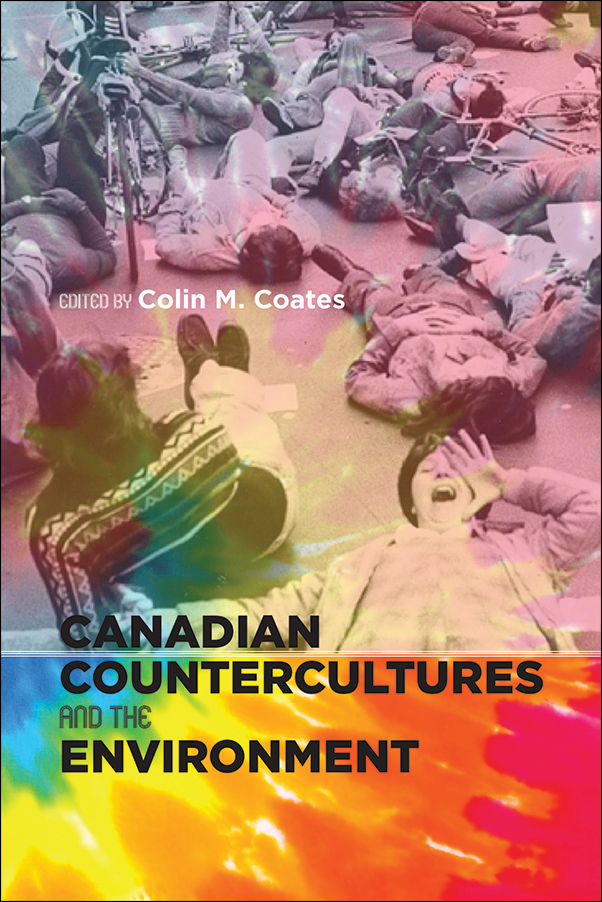
Canadian Countercultures and the Environment
Edited by Colin M. Coates
$34.95 CAD / $34.95 USD (S)
320 pages, 19 illustrations
6 x 9 inches
Paperback: 978-1-55238-814-3
Epub: 978-1-55238-817-4
Library PDF: 978-1-55238-816-7
February 2016
Discover the ways Canadian countercultures influenced environmental action, from recycling and urban cycling projects to organic farming and the back-to-the-land movement, during the intellectual firmament of the 1960s, 70s, and 80s.
Studies of the radical environmental politics of the 1960s have tended to downplay the extent to which much of that countercultural intellectual and social ferment continued into the 1970s and 1980s. Canadian Countercultures and the Environment adds to our knowledge of this understudied period. This collection contributes a sustained analysis of the beginning of major environmental debates in this era and examines a range of issues related to broad environmental concerns, topics which emerged as key concerns in the context of Cold War military investments and experiments, the oil crisis of the 1970s, debates over gendered roles, and the increasing attention to urban pollution and pesticide use.
No other publication dealing with this period covers the wide range of environmental topics (among others, activism, midwifery, organic farming, recycling, urban cycling, and communal living) or geographic locales, from Yukon to Atlantic Canada. Together, they demonstrate how this period influenced and informed environmental action and issues in ways that have had a long-term impact on Canadian society.
With Contributions By: Matt Cavers, Megan Davies, Nancy Janovicek, Alan MacEachern, David Neufeld, Ryan O’Connor, Kathleen Rodgers, Daniel Ross, Henry Trim, and Sharon Weaver
Colin M. Coates teaches environmental history and Canadian studies at York University. He is past president of the Canadian Studies Network–Réseau d’études canadiennes and was a member of the executive of NiCHE, the Network in Canadian History and Environment.
Acknowledgements
Contributors
Canadian Countercultures and Their Environments 1930s-1980s
Colin M. Coates
Section 1: Environmental Activism
Back–to–the–Land Environmentalism and Small Island Ecology: Denman Island, BC 1974&ndash1979
Sharon Weaver
"Good Ecology Is Good Economics" The Slocan Valley Community Forest Management Project, 1973–1979
Nancy Janovicek
American Immigration, the Canadian Counterculture, and the Prefigurative Environmental Politics of the West Kootenay Region, 1969–1989
Kathleen Rodgers
Countercultural Recycling in Toronto: The "Is Five Foundation" and the Origins of the Blue Box
Ryan O’Connor
"Vive la Vélorution!": Le Monde á Bicyclette and the Origins of Cycling Advocacy in Montreal
Daniel Ross
Section 2: People, Nature, Activities
An Ark for the Future: Secience, Techonlogy and the Canadian Back–to–the–Land Movement of the 1970s
Henry Trim
Dolars for "Deadbeats": Opportunities for Youth Grants and the Back–to–the–Land Movement British Columbia’s Sunshine Coast
Matt Cavers
Building Futures Together: Western and Aboriginal Countercultures and the Environment of the Yukon Territory
David Neufeld
Nature, Spirit, Home: Back–to–the–Land Childbirth in BC’s Kootenay Region
Megan J. Davies
Children of the Hummus: Growing Up Back–to–the–Land on Prince Edward Island
Alan MacEachern with Ryan O’Connor
This interesting and important collection of essays demonstrates that in bringing the values of consumption-oriented mainstream society into question, the youthful countercultural movement – including those who attempted to create their own utopias – made an important and lasting contribution to the environmental movement in Canada and further afield.
—Jack Little, Network in Canadian History & Environment
Youth countercultures of the late twentieth century undoubtedly influenced the development of environmental thought and activism in Canada. Canadian Countercultures and the Environment offers a rich collection of essays that explore the scale and significance of that activism.
—Sean Kheraj, Environmental History
1. Canadian Countercultures and their Environments, 1960s–1980s
2. Back-to-the-Land Environmentalism and Small Island Ecology: Denman Island, BC, 1974–1979
5. Countercultural Recycling in Toronto: The “Is Five Foundation” and the Origins of the Blue Box
6. “Vive la Vélorution!”: Le Monde à Bicyclette and the Origins of Cycling Advocacy in Montreal
8. Dollars for “Deadbeats”: Opportunities for Youth Grants and the Back-to-the-Land Movement
10. Nature, Spirit, Home: Back-to-the-Land Childbirth in BC’s Kootenay Region
11. Children of the Hummus: Growing Up Back-to-the-Land on Prince Edward Island